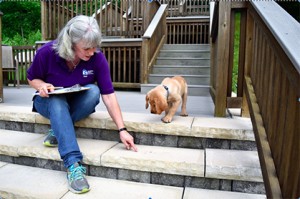IBM Watson Helps More Puppies Become Guiding Eyes for the Blind
 IBM (NYSE: IBM) today announced that Guiding Eyes for the Blind, a non-profit organization dedicated to the breeding, raising, training and placement of guide dogs with people who are blind or visually impaired, is using Watson on IBM Cloud to gain insights on increasing its success.
IBM (NYSE: IBM) today announced that Guiding Eyes for the Blind, a non-profit organization dedicated to the breeding, raising, training and placement of guide dogs with people who are blind or visually impaired, is using Watson on IBM Cloud to gain insights on increasing its success.
The stakes are high: each dog costs Guiding Eyes approximately $50,000 to train over two years. Until now, only half of the dogs raised and trained graduate as guide dogs or become elite breeders. Of all puppies bred at Guiding Eyes for the Blind, 37 percent eventually become guide dogs and another 13 percent are provided to other organizations to succeed in less demanding service dog work.
Guiding Eyes engaged Watson on the cloud to aid its quest to further optimize the process. Using Watson Natural Language Classifier, Personality Insights and other services, Guiding Eyes analyzed data on the cloud regarding genetic, health and behavior data spanning from birth through training for 1,200 dogs. The analysis predicted with 100 percent accuracy which dogs would be successful, hitting a home run in determining which volunteer puppy raiser-dog teams would be successful based on socialization, environments raised in and skills of the puppy raiser.
In the U.S., someone becomes blind every seven minutes, and as the baby boomer generation faces age-related vision loss, the demand is increasing. Ultimately, the Guiding Eyes and Watson partnership will increase graduation rates to help meet the growing demand for guide dogs, and lead to greater reward for volunteer puppy raisers as they see their efforts come to fruition
“Since Guiding Eyes was founded in 1954, we’ve graduated over 7,000 guide dog teams,” said Thomas Panek, CEO of Guiding Eyes for the Blind. “By partnering with IBM and applying Watson’s analysis to our process of breeding and training dogs, we can be even more successful in matching guide dogs with people who have vision loss. This means more individuals can achieve greater independence by being paired with an exceptional dog – and it is core to our mission at Guiding Eyes.”
“This opens countless opportunities for Guiding Eyes, aided by Watson, to unravel the complexities of nature versus nurture,” added Jane Russenberger, Director, Genetics and Breeding at Guiding Eyes.
“We are now planning an in-depth project to understand which environmental factors have the most influence in helping pups develop to their fullest potential. Embracing this innovation, we plan to apply Watson insights to improve the breeding, raising and training of dogs.”
To expand the scope of factors that Watson cloud services can take into account, Guiding Eyes and IBM are working with researchers at North Carolina State University to tackle the challenge of dog stress, one of the most difficult traits to measure and among the biggest predictors of a dog’s ability to graduate from the Guiding Eyes training program. Researchers are developing wearable devices equipped with sensors to measure behavior and heart rate level of puppies which provides objective measures of how puppies vary in their emotional response to potentially stressful situations, creating a Watson “Internet of Things for puppies” that can enable more effective breeding, raising and training.
According to Don Boulia, General Manager, IBM Cloud Developer Services, “Watson services on IBM Cloud are enabling Guiding Eyes to prepare puppies in new and more effective ways. It’s also a great example of what humans, machines – and now dogs – can do together to use data to improve the world.”
Short URL: https://caninechronicle.com/?p=129641
Comments are closed











